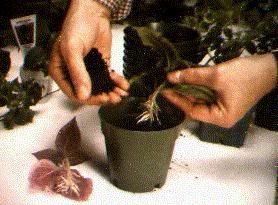Aeroponics time-warped tissue culture technology. It cloned plants in less time and reduced numerous labor steps associated with tissue culture techniques. Aeroponics could eliminate stage I and stage II plantings into soil (the bane of all tissue culture growers).
Cloned aeroponics transplanted directly into soil – its air roots made it all possible (1983).
Tissue culture plants must be planted in a sterile media (stage-I) and expanded out for eventual transfer into sterile soil (stage-II). After they're strong enough they are transplanted directly to field soil. Besides being labor intensive the entire process of tissue culture is prone to disease, infection, and failure.With the Genesis Machine growers cloned and transplanted air-rooted plants directly into field soil. Aeroponic roots were not susceptible to wilting and leaf loss or loss due to transplant shock (something hydroponics can never overcome). Because of their healthiness, air-rooted plants were less likely to be infected with pathogens.The efforts by GTi ushered in a new era of artificial life support for plants capable of growing naturally without the use of soil or hydroponics. GTi received a patent for an all- plastic aeroponic method and apparatus, controlled by a microprocessor in 1985.Aeroponics became known as a time and cost saver. The economic factors of aeroponic’s contributions to agriculture were taking shape.
Air-rooted Transplants
8:27 AM
ThanateTan







